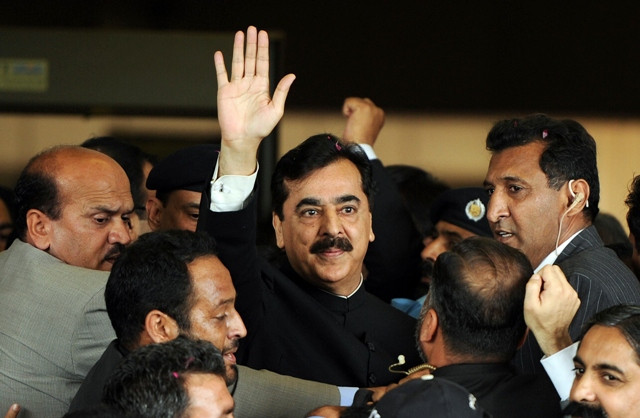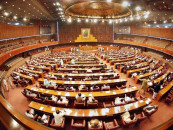PM contempt: SC issues detailed order
Without conviction, others would have followed Gilani's example, says detailed order.

The detailed order can be read here.
The order has been compiled by Justice Nasirul Mulk and a six-page additional note has been written by Justice Asif Saeed Khosa.
The detailed verdict came out on the day when Gilani left for the UK on an official trip to participate in the Enhanced Strategic Dialogue with the British leadership with only 12 members entourage.
The document consists of statements presented in different phases of the case by Gilani’s counsel Aitzaz Ahsan and the attorney general of Pakistan.
Gilani’s counsel Aitzaz Ahsan, talking to Express News, said that the detailed order has provided more grounds for an appeal to be filed.
“Even the short order was inappropriate… Right now, I’m not ready to comment in detail about the verdict,” he said.
Article 204(2) provides sufficient coverage
In the detailed verdict, the court clarified that:
The said Ordinance V of 2003 derives its authority from Article 204(3) of the Constitution, Article 204(2) of the Constitution itself empowers this Court to punish a person for committing “Contempt of Court” and the above mentioned words used in the Charge framed against the accused also stand sufficiently covered by the provisions of Article 204(2) of the Constitution.
Grave offence
The court further clarified that Prime Minister Gilani's contempt was considered a grave offence:
These provisions of the Contempt of Court Ordinance clearly show that despite his culpability having been established, a Court seized of a matter of contempt is not to hold the offender guilty or punish him for every trivial contempt committed and it is only a grave contempt having the effects mentioned in Section 18(1) that may be visited with a finding of guilt or punishment.
We are, therefore, fully satisfied that such clear and persistent defiance at such a high level constitutes contempt which is substantially detrimental to the administration of justice and tends not only to bring this Court but also brings the judiciary of this country into ridicule.
Setting an example
The Supreme Court also said that not charging the prime minister for contempt would leave the judiciary open to others following his example:
After all, if orders or directions of the highest court of the country are defied by the highest Executive of the country then others in the country may also feel tempted to follow the example leading to a collapse or paralysis of administration of justice besides creating an atmosphere wherein judicial authority and verdicts are laughed at and ridiculed.
Case background
The Supreme Court had convicted Gilani on April 26, 2012. If the conviction was historic, the sentence was largely symbolic – detaining the prime minister in courtroom number 4 till the “rising of the court” or about 37 seconds to be precise.
Gilani was held in contempt by the Supreme Court for his refusal to write a letter to Swiss authorities to reopen graft cases against President Asif Ali Zardari.
A seven-member bench headed by Justice Nasirul Mulk had announced the verdict and convicted him for violating Contempt of Court Ordinance 2003 section 5 and the charges framed against him were for willfully disobeying the court’s orders and ridiculing it.
Appeal
Gilani can appeal against the verdict within a period of 30 days, a deadline which had started when the short order was announced.
A new bench will be constituted to hear the appeal.
Disqualification?
As stated in the short order released earlier by the Supreme Court, Gilani may be disqualified from parliament:
"It may not be lost sight of that, apart from the other consequences, by virtue of the provisions of clauses (g) and (h) of Article 63(1) read with Article 113 of the Constitution a possible conviction on such a charge may entail a disqualification from being elected or chosen as, and from being, a member of Majlis-e-Shoora (Parliament) or a Provincial Assembly for at least a period of five years.”
"Anyone who flouts Article 63(1)(g) gets disqualified for a period of five years," said Justice (retd) Shaiq Usmani while talking to Express News.
‘Cannot consider conviction till appeal exhausted’
Attorney-General of Pakistan Irfan Qadir, reacting to the full verdict of the Supreme Court, said that It would not be fair to consider the Prime Minister as convicted till he exhausts his right of appeal in the contempt of court judgment.
Asked about the appeal‚ he said the Government would decide about an appeal after examining the detailed verdict.
The Attorney-General said another view could be that the court acted beyond its mandate and therefore‚ it should be approached to rectify a wrong.
Replying to a question he said if the issue of disqualification goes to the Speaker, then she will have to consider whether or not the order of the court is violative of any provision of the Constitution or law. In the scenario she considers that the Prime Minister stands disqualified, then the matter would be referred to the Election Commission for a final decision.




1735037907-0/Tribune-N-(2)1735037907-0-208x130.webp)














COMMENTS
Comments are moderated and generally will be posted if they are on-topic and not abusive.
For more information, please see our Comments FAQ